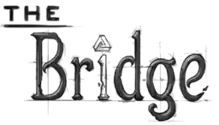The Bridge (video game)
The Bridge is an indie video game designed by American indie developer Ty Taylor for Microsoft Windows, Linux, OS X, Amazon Fire TV, Android, Xbox 360, Xbox One, Ouya, PlayStation 3, PlayStation 4, PlayStation Vita, Wii U, and Nintendo Switch.[1] In the game, the player controls an Escher-like character and the rotation of the 2D environment, which affects gravity based on the changing orientation of the landscape.[2]
| The Bridge | |
|---|---|
 | |
| Developer(s) | The Quantum Astrophysicists Guild |
| Publisher(s) | The Quantum Astrophysicists Guild |
| Designer(s) | Ty Taylor Mario Castañeda |
| Programmer(s) | Ty Taylor |
| Artist(s) | Mario Castañeda |
| Composer(s) | Kevin MacLeod |
| Engine | Unity |
| Platform(s) | Microsoft Windows, Xbox 360, Xbox One, Android, Amazon Fire TV, Ouya, PlayStation 3, PlayStation 4, PlayStation Vita, Wii U, Nintendo Switch |
| Release | Microsoft Windows February 22, 2013 Xbox Live Arcade November 13, 2013 Linux May 15, 2014 OS X May 16, 2014 Android, Amazon Fire TV June 30, 2014 Xbox One August 14, 2015 PlayStation 3, PlayStation 4, PlayStation Vita, Ouya August 18, 2015 Wii U August 20, 2015 Nintendo Switch September 7, 2017 |
| Genre(s) | Puzzle, art |
| Mode(s) | Single-player |
Gameplay
The game consists of various levels, the goal of which is to get the main character to the exit door. The game's puzzles are inspired by the art of M. C. Escher and like his artworks, each level unfolds in grayscale with hand-drawn illustrations.[3] The player can rotate the world using the arrow keys, changing the gravitational direction of individual objects, or control the main character with A and D to go left and right.[1][2] The Wii U version utilizes the GamePad touch and accelerometer. The player can use the Wii U GamePad touch capabilities to interact with the world to move the character, open doors, activate objects, and interact with the menu system and UI. The player can also tilt the Wii U GamePad to rotate gravity in the game.
Plot
The game opens with the nameless main character sleeping under an apple tree. After an apple hits him in the head and wakes him up, he is guided to his house with three doors, behind which lie further doors and levels. The story is explained through the environment and post-world text as the game progresses.[1][4]
Reception
| Aggregator | Score |
|---|---|
| Metacritic | PC: 74/100[5] X360: 76/100[6] XONE: 72/100[7] WIIU: 78/100[8] NS: 74/100[9] |
| Publication | Score |
|---|---|
| Eurogamer | 6.0/10[4] |
| Game Informer | 7.5/10[2] |
| GameSpot | 7.5/10[3] |
| Nintendo Life |
The Bridge received positive reviews from critics. It has an aggregate score of 74/100 on Metacritic.[5] The game won the 2012 Indie Game Challenge award for Achievement in Art Direction and Achievement in Gameplay.[11]
See also
References
- Hancock, Patrick (March 7, 2013). "It turns out that ceilings can be floors". Destructoid. Retrieved July 7, 2013.
- Marchiafava, Jeff (February 26, 2013). "Stumbling Toward Fun At A Sluggish Pace". Game Informer. Retrieved July 7, 2013.
- Johnson, Leif (March 1, 2013). "The Bridge Review - GameSpot.com". GameSpot. Retrieved July 7, 2013.
- Whitehead, Dan (March 1, 2013). "The Bridge review - Let's twist again". Eurogamer. Retrieved July 7, 2013.
- "The Bridge (2013) for PC Reviews". Metacritic. CBS Interactive. Retrieved July 7, 2013.
- "The Bridge for Xbox 360 Reviews". Metacritic. CBS Interactive. Retrieved January 17, 2020.
- "The Bridge for Xbox One Reviews". Metacritic. CBS Interactive. Retrieved January 17, 2020.
- "The Bridge for Wii U Reviews". Metacritic. CBS Interactive. Retrieved January 17, 2020.
- "The Bridge for Switch Reviews". Metacritic. CBS Interactive. Retrieved January 17, 2020.
- Bowling, Steve (August 19, 2015). "The Bridge (Wii U eShop) Review". Nintendo Life. Archived from the original on August 19, 2015. Retrieved August 19, 2015.
- Tach, Dave (December 15, 2012). "GameStop cancels this year's Indie Game Challenge, future unclear". Polygon. Retrieved July 7, 2013.